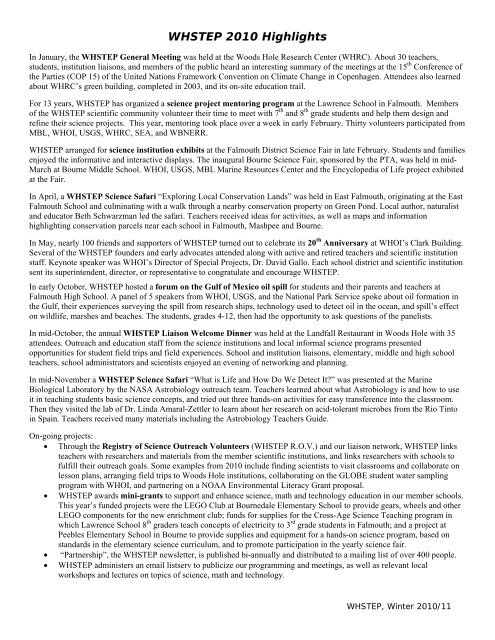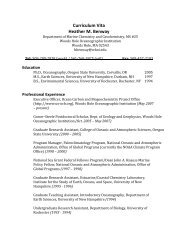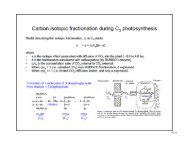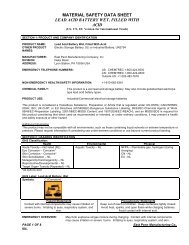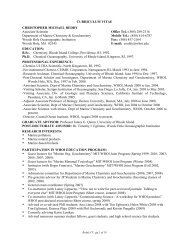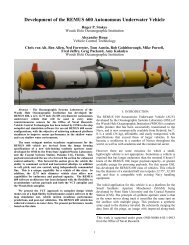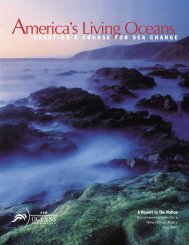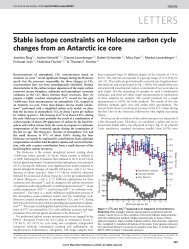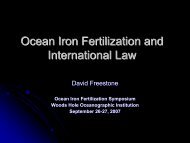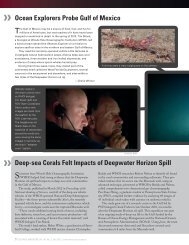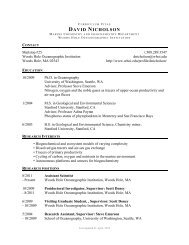Partnership - Woods Hole Oceanographic Institution
Partnership - Woods Hole Oceanographic Institution
Partnership - Woods Hole Oceanographic Institution
Create successful ePaper yourself
Turn your PDF publications into a flip-book with our unique Google optimized e-Paper software.
WHSTEP 2010 Highlights<br />
In January, the WHSTEP General Meeting was held at the <strong>Woods</strong> <strong>Hole</strong> Research Center (WHRC). About 30 teachers,<br />
students, institution liaisons, and members of the public heard an interesting summary of the meetings at the 15 th Conference of<br />
the Parties (COP 15) of the United Nations Framework Convention on Climate Change in Copenhagen. Attendees also learned<br />
about WHRC’s green building, completed in 2003, and its on-site education trail.<br />
For 13 years, WHSTEP has organized a science project mentoring program at the Lawrence School in Falmouth. Members<br />
of the WHSTEP scientific community volunteer their time to meet with 7 th and 8 th grade students and help them design and<br />
refine their science projects. This year, mentoring took place over a week in early February. Thirty volunteers participated from<br />
MBL, WHOI, USGS, WHRC, SEA, and WBNERR.<br />
WHSTEP arranged for science institution exhibits at the Falmouth District Science Fair in late February. Students and families<br />
enjoyed the informative and interactive displays. The inaugural Bourne Science Fair, sponsored by the PTA, was held in mid-<br />
March at Bourne Middle School. WHOI, USGS, MBL Marine Resources Center and the Encyclopedia of Life project exhibited<br />
at the Fair.<br />
In April, a WHSTEP Science Safari “Exploring Local Conservation Lands” was held in East Falmouth, originating at the East<br />
Falmouth School and culminating with a walk through a nearby conservation property on Green Pond. Local author, naturalist<br />
and educator Beth Schwarzman led the safari. Teachers received ideas for activities, as well as maps and information<br />
highlighting conservation parcels near each school in Falmouth, Mashpee and Bourne.<br />
In May, nearly 100 friends and supporters of WHSTEP turned out to celebrate its 20 th Anniversary at WHOI’s Clark Building.<br />
Several of the WHSTEP founders and early advocates attended along with active and retired teachers and scientific institution<br />
staff. Keynote speaker was WHOI’s Director of Special Projects, Dr. David Gallo. Each school district and scientific institution<br />
sent its superintendent, director, or representative to congratulate and encourage WHSTEP.<br />
In early October, WHSTEP hosted a forum on the Gulf of Mexico oil spill for students and their parents and teachers at<br />
Falmouth High School. A panel of 5 speakers from WHOI, USGS, and the National Park Service spoke about oil formation in<br />
the Gulf, their experiences surveying the spill from research ships, technology used to detect oil in the ocean, and spill’s effect<br />
on wildlife, marshes and beaches. The students, grades 4-12, then had the opportunity to ask questions of the panelists.<br />
In mid-October, the annual WHSTEP Liaison Welcome Dinner was held at the Landfall Restaurant in <strong>Woods</strong> <strong>Hole</strong> with 35<br />
attendees. Outreach and education staff from the science institutions and local informal science programs presented<br />
opportunities for student field trips and field experiences. School and institution liaisons, elementary, middle and high school<br />
teachers, school administrators and scientists enjoyed an evening of networking and planning.<br />
In mid-November a WHSTEP Science Safari “What is Life and How Do We Detect It?” was presented at the Marine<br />
Biological Laboratory by the NASA Astrobiology outreach team. Teachers learned about what Astrobiology is and how to use<br />
it in teaching students basic science concepts, and tried out three hands-on activities for easy transference into the classroom.<br />
Then they visited the lab of Dr. Linda Amaral-Zettler to learn about her research on acid-tolerant microbes from the Rio Tinto<br />
in Spain. Teachers received many materials including the Astrobiology Teachers Guide.<br />
On-going projects:<br />
� Through the Registry of Science Outreach Volunteers (WHSTEP R.O.V.) and our liaison network, WHSTEP links<br />
teachers with researchers and materials from the member scientific institutions, and links researchers with schools to<br />
fulfill their outreach goals. Some examples from 2010 include finding scientists to visit classrooms and collaborate on<br />
lesson plans, arranging field trips to <strong>Woods</strong> <strong>Hole</strong> institutions, collaborating on the GLOBE student water sampling<br />
program with WHOI, and partnering on a NOAA Environmental Literacy Grant proposal.<br />
� WHSTEP awards mini-grants to support and enhance science, math and technology education in our member schools.<br />
This year’s funded projects were the LEGO Club at Bournedale Elementary School to provide gears, wheels and other<br />
LEGO components for the new enrichment club; funds for supplies for the Cross-Age Science Teaching program in<br />
which Lawrence School 8 th graders teach concepts of electricity to 3 rd grade students in Falmouth; and a project at<br />
Peebles Elementary School in Bourne to provide supplies and equipment for a hands-on science program, based on<br />
standards in the elementary science curriculum, and to promote participation in the yearly science fair.<br />
� “<strong>Partnership</strong>”, the WHSTEP newsletter, is published bi-annually and distributed to a mailing list of over 400 people.<br />
� WHSTEP administers an email listserv to publicize our programming and meetings, as well as relevant local<br />
workshops and lectures on topics of science, math and technology.<br />
WHSTEP, Winter 2010/11


